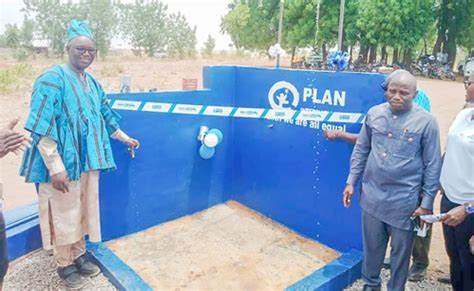Residents of Diani, a farming community in the West Mamprusi Municipality in the North East Region, now have a mechanised water system to provide the
Residents of Diani, a farming community in the West Mamprusi Municipality in the North East Region, now have a mechanised water system to provide the community and its environs with safe and potable drinking water.
The facility, constructed at a cost of GH¢180,000, is expected to serve more than 1,200 residents in the Diani community and its environs. It has a storage capacity of 10 cubic metres (Rambo 10,000 polytank) with four fetching points across the community.
Diani has had serious water problems for many years and relied on dugouts situated on the outskirts of the community as its source of drinking water. Hitherto, the residents, especially women and children, used to trek several kilometres in search of potable water each day.
Aside from the water facility, a girl-friendly institutional latrine equipped with basic facilities for menstrual hygiene has also been constructed for the Diani Primary School, to enable girls to remain in school during menstrual periods.
The facilities, constructed by Plan International Ghana with funding support from Plan International Germany, form part of a three-year Integrated Package for Sustainable Community Development (IPADEV) project being implemented in the area.
The project seeks to contribute and create a resilient and protective environment, both at home and school, for better health and learning outcomes for children, especially girls through equitable access and effective utilisation of WASH, education, health facilities and services.
Safe drinking water
Inaugurating the facilities, the Country Director of Plan International Ghana, Contant Tchona, said the organisation found it an important part of its work to provide safe drinking water for deprived communities.
He said access to safe, adequate and affordable water, sanitation and hygiene services was very crucial in promoting girls and women’s empowerment since it enhanced their dignity and position in the community.
He noted that inadequate quality water and sanitation facilities in schools disproportionately and negatively impacted on the educational outcomes and social status of girls, especially in rural areas.
“Most schools in Ghana are not equipped with basic facilities for menstrual health and hygiene management such as places for changing, running water, disposal facilities and menstruation materials and this is negatively affecting girls’ education,” Mr Tchona said.
Gratitude
The North East Regional Minister, Yidana Zakaria, expressed his profound appreciation to Plan International Ghana for its continuous contribution to the development of the region, especially in the areas of safe drinking water and education.
He said that the project was in line with Goal 6 of the United Nations Sustainable Development Goal, which aimed to provide clean water and sanitation for all by 2030. While urging the community to take proper care of the facilities to enable them to serve their intended purposes, Mr Zakaria charged the public to desist from all practices that pollute water bodies, as they were the very existence of human lives.
Residents of the area could not hide their joy over the project as they danced to traditional music provided by a local cultural troupe. The inaugural ceremony was also to commemorate World Water Day, which is celebrated on March 22, every year.
Some of the residents who spoke to the Daily Graphic commended Plan International Ghana for the gesture and promised to take good care of the facilities.

COMMENTS